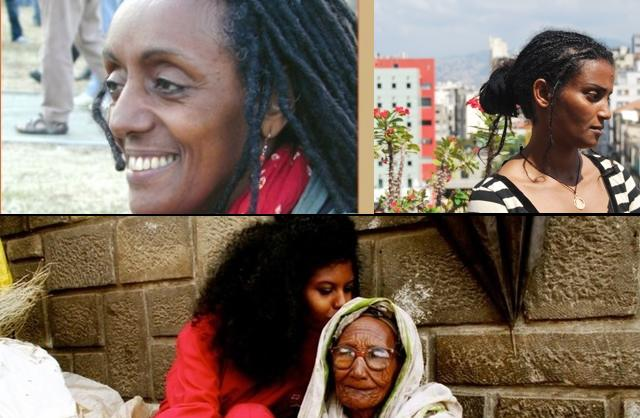 AllAfrica's Genet Lakew and Rahwa Meharena asked three women - Salem Mekuria (top left), Rahel Zegeye (top right) and Sosena Solomon (bottom left) - to share their stories. They represent two generations of Ethiopian documentary filmmaking.
AllAfrica's Genet Lakew and Rahwa Meharena asked three women - Salem Mekuria (top left), Rahel Zegeye (top right) and Sosena Solomon (bottom left) - to share their stories. They represent two generations of Ethiopian documentary filmmaking.
AllAfrica.com | Women Filmmakers Tell Their Stories
Documentary filmmaking holds a special place in the history of African women’s cinema. In 1972, Senegalese filmmaker Safi Faye became the first sub-Saharan African woman to make a commercially distributed feature film when she directed “Kaddu Beykat”. The film, a mixture of fiction and documentary, depicts the economic problems suffered by Senegalese village farmers because of agriculture policies that Faye says rely on an outdated, colonial system of groundnut monoculture. Faye would go on to direct several documentaries often focused on rural life in her native Senegal.
African women who have taken documentary filmmaking to new levels come from across the continent and handle a wide range of topics. The films show an Africa that is not often seen, according to Beti Ellerson, director of the Center for the Study and Research of African Women in Cinema. Ellerson, who teaches courses in African studies, visual culture and women studies in the Washington, DC, area, is also the producer of a 2002 documentary, “Sisters of the Screen: African Women in the Cinema.”
Much has changed since Faye’s early Senegalese films. The emergence of the Internet, social media and crowd-funding platforms such as Kickstarter now offer a new generation of African women documentary filmmakers the tools to realize their visions. To learn of the challenges and opportunities facing African women filmmakers, AllAfrica’s Genet Lakew and Rahwa Meharena asked three women – Salem Mekuria, Rahel Zegeye and Sosena Solomon – to share their stories. They represent two generations of Ethiopian documentary filmmaking.

























